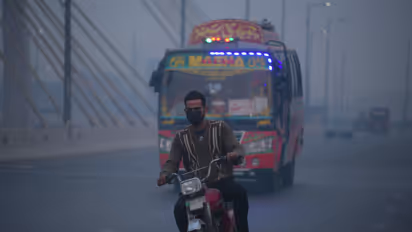Pakistan chokes with alarming levels of air pollution; Multan under 'lockdown' as AQI crosses 2,100

Synopsis
A high alert has been issued in Multan, the largest city in Pakistan’s Punjab province, following an alarming spike in the Air Quality Index (AQI) to over 2,000, signaling dangerously hazardous pollution levels.
A high alert has been issued in Multan, the largest city in Pakistan’s Punjab province, following an alarming spike in the Air Quality Index (AQI) to over 2,000, signaling dangerously hazardous pollution levels. According to reports from Dawn and monitoring by Swiss air quality platform IQAir, the AQI reached an unprecedented reading of 2,135 in the early hours of Friday, far surpassing the World Health Organization's (WHO) safe limit for air quality.
This extreme pollution, primarily caused by high levels of PM2.5 particles, poses a severe health risk to the city's residents. The fine particulate matter, which can penetrate deep into the lungs and bloodstream, was recorded at 947 micrograms per cubic meter, nearly 190 times higher than the WHO’s recommended safe level of 5 micrograms.
The air quality gradually improved, with the AQI dropping to 980 by Friday evening. However, it remained well above the “hazardous” threshold of 300, continuing to endanger public health. Local monitoring stations across the city, including WWF-Pakistan, Shamsabad Colony, and Multan Cantonment, reported similar alarming readings.
The heavy smog blanketing Multan has not only affected the city but has also spread to surrounding regions such as Bahawalpur, Muzaffargarh, and Khanewal, significantly reducing road visibility and exacerbating health risks.
Multan authorities declare 'smart lockdown'
In response to the crisis, local authorities in Multan, including Deputy Commissioner Waseem Hamid Sindhu, have declared a “smart lockdown.” The lockdown mandates the closure of markets by 8 p.m. and gives traffic police the authority to enforce action against vehicles emitting excessive smoke. Additionally, measures have been taken to curb illegal activities contributing to the pollution, such as stubble burning, waste fires, and the operation of brick kilns without the required pollution-control technology.
Despite these actions, reports from the ground indicate that enforcement has been inconsistent, with some residents questioning the effectiveness of the measures in curbing the crisis.
The local government has also closed parks, museums, and schools across Punjab until November 17 to protect the public from the hazardous air. Multan’s Nishtar Hospital has set up special counters for treating those affected by the smog, anticipating a rise in respiratory illnesses and other pollution-related health issues.
Check the Breaking News Today and Latest News from across India and around the world. Stay updated with the latest World News and global developments from politics to economy and current affairs. Get in-depth coverage of China News, Europe News, Pakistan News, and South Asia News, along with top headlines from the UK and US. Follow expert analysis, international trends, and breaking updates from around the globe. Download the Asianet News Official App from the Android Play Store and iPhone App Store for accurate and timely news updates anytime, anywhere.